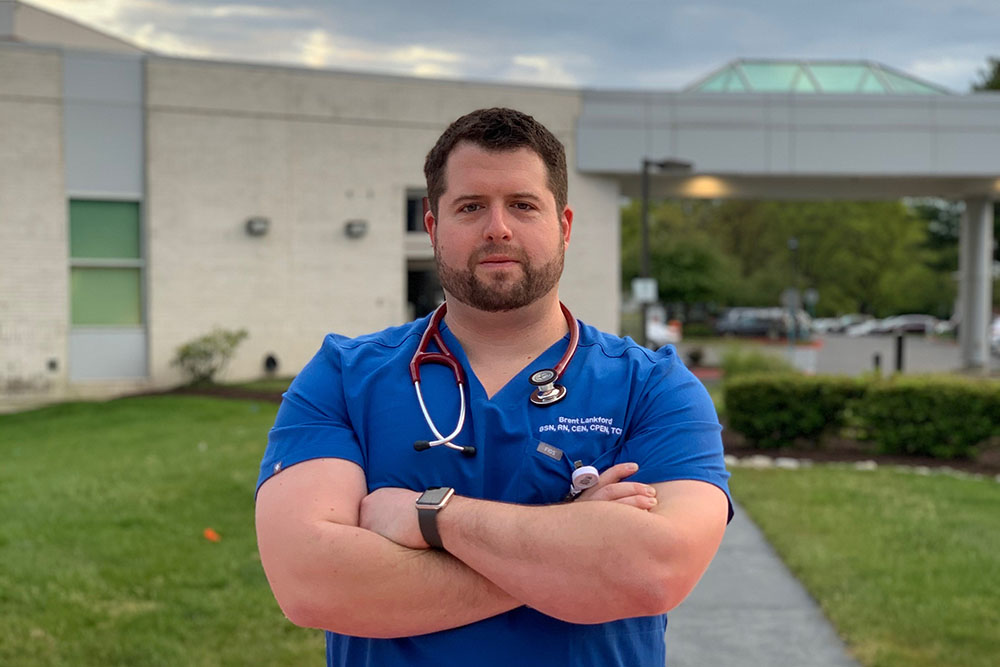
Ready on the Western Shore
Emergency department charge nurse. Volunteer fire chief. Part-time educator. Father. Son. Brother.
Brent Lankford (BSN ’10) wears many hats in his Calvert County, Md., hometown. And lately, the number of hats has increased as his region began to prepare and plan for the arrival of COVID-19.
“My role as an [emergency department] (ED) charge nurse has changed,” says Lankford. “I’m not only a supervisor now, but also a community outreach coordinator. Calls from community members with COVID questions come to the charge nurses. There is a fear and stigma around this disease, and we are trying our best to reassure people and encourage them to stay home if they’re feeling ill and their symptoms are mild.”
Lankford, who works for Calvert Health Medical Center in southern Maryland, has been planning for an outbreak of the disease for months. “We’re a suburb of Washington, D.C.,” he explains. “Lots of people in our county commute to D.C. for work, so we are vulnerable to an increase in [COVID-19] cases here.”
Lankford has also instituted procedural changes at the hospital to mitigate the virus’s spread. That means logical shifts in the way emergencies are handled, including having ambulances stage in a bay, where staff come out to meet them, rather than bringing patients directly into the ED. This prevents possible exposures of the virus to ambulance staff, and properly routes patients who have the potential to unwittingly expose others in the ED.
Because it’s a modest-sized community hospital, Calvert Health typically has just one ICU, given that most critically ill patients get transferred to other hospitals such as Johns Hopkins or George Washington Hospital. But since Lankford is in charge of anticipating a much larger, much sicker patient population in this area, the hospital has nearly tripled its ICU capability.
“There are currently about 41 cases of COVID-19 in our county,” Lankford says. “But if there is a larger outbreak here, the care will be more intense, requiring more PPE, more staff. We want to be ready for it.”
In addition to being a nurse, Lankford is also fire chief for Calvert County’s St. Leonard Volunteer Fire Department, work that runs in his family. His mom, Jen, also a nurse, is St. Leonard’s former fire chief, while father Bill is a local emergency response technician for the county. Along with his three weekly 12-hour shifts in the ED, Lankford does double duty each day at the fire department prepping staff on new COVID-19 protocols and precautions should their region experience an outbreak.
“The School prepared me leaps and bounds for this. Compassionate care and resilience training were instilled in every class and lesson at UVA . . . it set me apart.”
Brent Lankford (BSN `10)
It's the unknowns that weigh most heavily on Lankford.
“I’ve lost a lot of sleep over this,” he says. “We don’t know yet what the patient volume will be, how many calls we’ll get. I want to ensure staff safety with the proper [personal protective equipment] PPE. They’re in such close quarters with the people who call us for help.”
Once the panic has passed, Lankford believes nursing and medicine will fundamentally change in ways both good and bad.
“I think we will all be better clinicians, and we’ll be better prepared for future outbreaks like this,” he says. “But the trauma of it makes me really concerned for the mental health of our medical staff,” noting that he sees redeployed clinicians who aren’t prepared for COVID patients and the considerations they bring.
These caregivers “are struggling,” Lankford says. “They’re asking themselves, ‘If I had been better trained for this, would the patient’s outcome have been different? Could I have saved them?’”
Ultimately, Lankford hopes that all nurses will become nimbler and more comfortable in roles throughout the hospital, should an outbreak occur again. He’s thankful, too, for the lessons he learned at UVA about the importance of well-being and resilience, even—perhaps especially—during times of stress.
The School “prepared me leaps and bounds for this,” he says. “Compassionate care and resilience training were instilled in every class and lesson at UVA . . . it set me apart.”

